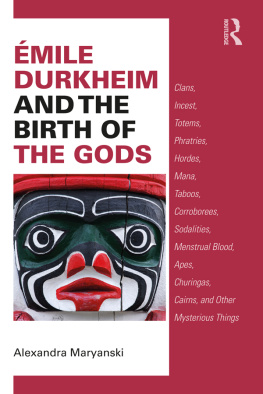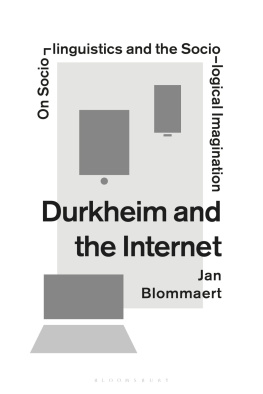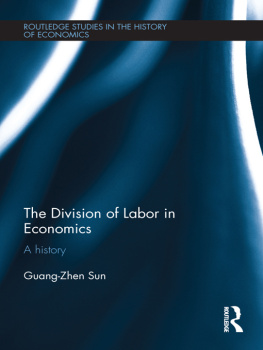Durkheim - The Division of Labor in Society
Here you can read online Durkheim - The Division of Labor in Society full text of the book (entire story) in english for free. Download pdf and epub, get meaning, cover and reviews about this ebook. year: 2013, publisher: Digireads.com, genre: Science. Description of the work, (preface) as well as reviews are available. Best literature library LitArk.com created for fans of good reading and offers a wide selection of genres:
Romance novel
Science fiction
Adventure
Detective
Science
History
Home and family
Prose
Art
Politics
Computer
Non-fiction
Religion
Business
Children
Humor
Choose a favorite category and find really read worthwhile books. Enjoy immersion in the world of imagination, feel the emotions of the characters or learn something new for yourself, make an fascinating discovery.

The Division of Labor in Society: summary, description and annotation
We offer to read an annotation, description, summary or preface (depends on what the author of the book "The Division of Labor in Society" wrote himself). If you haven't found the necessary information about the book — write in the comments, we will try to find it.
The Division of Labor in Society — read online for free the complete book (whole text) full work
Below is the text of the book, divided by pages. System saving the place of the last page read, allows you to conveniently read the book "The Division of Labor in Society" online for free, without having to search again every time where you left off. Put a bookmark, and you can go to the page where you finished reading at any time.
Font size:
Interval:
Bookmark:
THE DIVISION OF LABOR IN SOCIETY
BY MILE DURKHEIM
TRANSLATED BY GEORGE SIMPSON
eBook ISBN 13: 978-1-4209-4857-8
ISBN 13: 978-1-4209-4856-1
This edition copyright 2013
Please visit www.digireads.com
CONTENTS
To
ROBERT MORRISON MacIVER
and
GEORGE EDWARD GORDON CATLIN
Boni praeceptores boni
The need for an English translation of Emile Durkheim's De la division du travail social has long been felt. The first great work of a man who controlled French social thought for almost a quarter of a century and whose influence is now waxing rather than waning, it remains today, both from an historical and contextual standpoint, a book that must be read by all who profess some knowledge of social thought and some interest in social problems. First published in 1893 with the subtitle, tude sur l ' Organisation des Socits Suprieures , and a dedication "A Mon Cher Matre, M. Emile Boutroux, Hommage respectueux et reconnaissant " it has gone through five editions, the last having been brought out in 1926, nine years after Durkheim's death. The second edition appeared in 1902 with the now classic preface, Quelques Remarques sur les Groupements professionnels. The third edition appeared in 1907, the fourth in 1911.
In the second and subsequent editions Durkheim omitted many pages from the long introduction which he wrote for the first. I feel, however, that this introduction is fundamental to an understanding of Durkheim's position and valuable in itself, besides being indispensable to an appreciation of a study which Durkheim had again turned to in his last years and which he considered his crowning work, the science of ethics. Consequently, I have appended it at the end of this volume. Nowhere else, except in the first French edition (now out of print), can this, Durkheim's early development of the idea of a science of ethics, be found. Hence I consider it a great boon to sociological scholarship that I was enabled to have this first edition at my disposal, and present it to an English-speaking audience.
The translation has been made from the first and fifth editions only. The sole difficulty I encountered in thus having to restrict myself to these two is that Durkheim did not edit the last edition, and, from all appearances, neither did any of his students or colleagues. Besides the additional preface and the omission of much of the introduction, there was little omitted or added in any of the editions. The footnote to chapter one of book one in the first edition could not have appeared in later editions since it refers to material in the first edition which was omitted in all subsequent editions. I have placed it there with a note of my own. Near the end of chapter two of book two, three and a half lines were added which are important, since they answer the charge of jingoism made against Durkheim and show his international leanings. They read thus: "Inversement, tout retour d'un nationalisme troit a toujours pour consquence un developpement de l'esprit protectionniste, c'est--dire une tendance des peuples s'isoler, conomiquement et moralement, les uns des autres." In its context it tacitly expresses a condemnation of nationalism and is the best refutation of Durkheim's ad hoc pamphlets published during the war, Qui a voulu la guerre ? Les origines de la guerre d ' aprs les documents diplomatiques (in collaboration with E. Denis); " L ' Allemagne au-dessus de tout " la mentalit allemande et la guerre ; and Les lettres tous les franais. In chapter one of book two in a sentence concerning suicide among lower peoples, certain words generalizing the main thought concerning the rarity of suicides among such people were omitted. I have noted this omission in a footnote. It is probable that Durkheim's work on suicide contained in that remarkable study in social causation, Le Suicide , led him to extenuate the broad generalization he was there making.
The title page of all the editions contained a quotation from Aristotle's Politics (B, I, 1261a, 24), reading as follows:
.
Mention should be made of my translation of terms peculiar to Durkheim's sociology. The French word "conscience" I have translated as conscience ; the usual translation of Durkheim's term, consciousness , seems to me to be a gross misinterpretation of Durkheim's meaning. A conscience for Durkheim (although never expressly defined) is pre-eminently the organ of sentiments and representations; it is not the rational organ that the term "consciousness" would imply. The qualities possessed by a conscience whether collective or individual are not those generally imputed to consciousness in German, English, and American epistemology. Moreover, the moral character of the sentiments and representations in a conscience would seem to render my translation more in the spirit, as well as the letter, of the original. In fact, the term has resemblance to the term "unconscious" in psychoanalysis, rather than to consciousness in logical theory. The terms "collective" and "commune" Durkheim employed interchangeably in referring to a conscience of such a sort. Their interchangeable character is shown by an error made in calling the conscience "commune" in the subtitle of chapter three of book two of the main text, and printing it as "collective" in the heading of that chapter in the table of contents. In this instance, I have made both of them read common.
To translate Durkheim's term "anomie" I have called back to life an English word obsolete since 1755 and first used in 1591, anomy. The Shorter Oxford English Dictionary finds it used in its earlier period to mean "disregard of (divine) law," and in its later, "lawlessness." Its derivation is direct from the Greek . The adjective of this noun which Durkheim uses, "anomique," has no English counterpart, obsolete or current, and I have had to coin a word which I hope gains some currency because of its fullness of meaning. That word is anomic. The Greek for it is .
The words "sentiment" and "representation" I have translated as sentiment and representation. These words, too, Durkheim defined only by implication, but I think that the same English terms will convey the sense intended by the original. Sometimes I have translated "similitude" as likeness and sometimes as similitude. In the first chapter of book two, Durkheim refers to the plural "progrs" of the division of labor, implying not the ethical term, progress , but rather the vitalistic term, advances. Durkheim uses the word in the plural and I have sometimes translated it as advances , and sometimes by the singular, progress. This is mentioned here to warn the reader that it is not to be confused with Spencer's term, nor with the popular use of the word to mean moral superiority. I have often translated "la morale" as ethics , although sometimes as morality. I do not think Durkheim made any sharp distinction between them. At least the context never shows it.
The picture of Durkheim which appears as the frontispiece in this volume is not a late one; it dates from about 1903. I should have preferred to have used a later one, but the photographs to which I had access and which were of a later date are either very bad and very difficult of reproduction, or else show Durkheim when he was in the throes of the illness which was to be fatal to him and consequently do not catch the spirit and vigor of a great mind.
Where Durkheim has quoted Spencer directly from the French translations of Spencer's works, I have translated from the French and placed the matter in indirect statement; the page references I have left as referring to the French translations. Where Durkheim quotes Spencer in order to criticize him adversely, as in the majority of the cases, there would seem to be no reason for being interested in Spencer's ideas after Durkheim has finished with them. In truth, there is scarcely any mind, even though tutored in logic and philosophy, as Spencer's certainly was not, that can stand up under the attack of Durkheim's incisive thinking on topics to which he has given keen attention.
Next pageFont size:
Interval:
Bookmark:
Similar books «The Division of Labor in Society»
Look at similar books to The Division of Labor in Society. We have selected literature similar in name and meaning in the hope of providing readers with more options to find new, interesting, not yet read works.
Discussion, reviews of the book The Division of Labor in Society and just readers' own opinions. Leave your comments, write what you think about the work, its meaning or the main characters. Specify what exactly you liked and what you didn't like, and why you think so.






